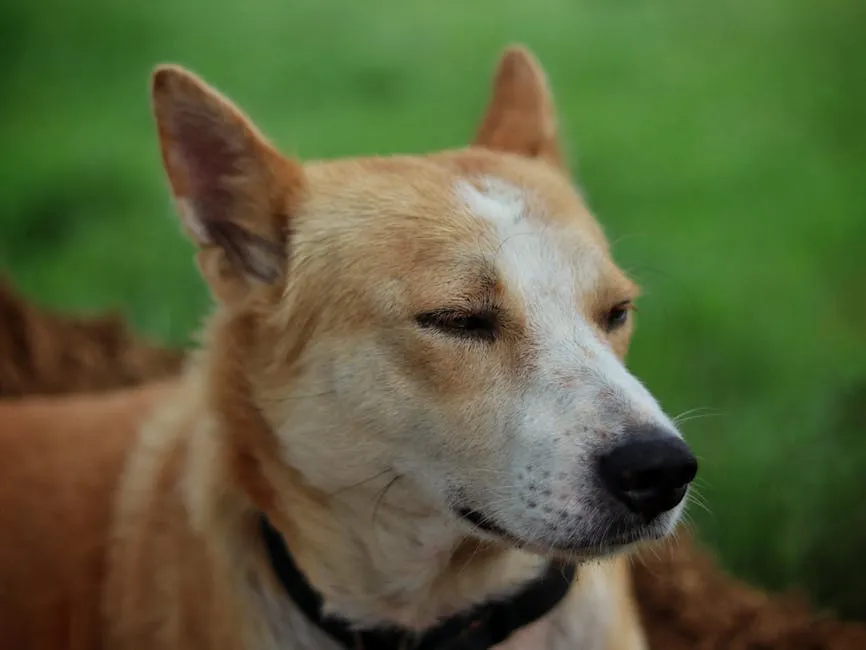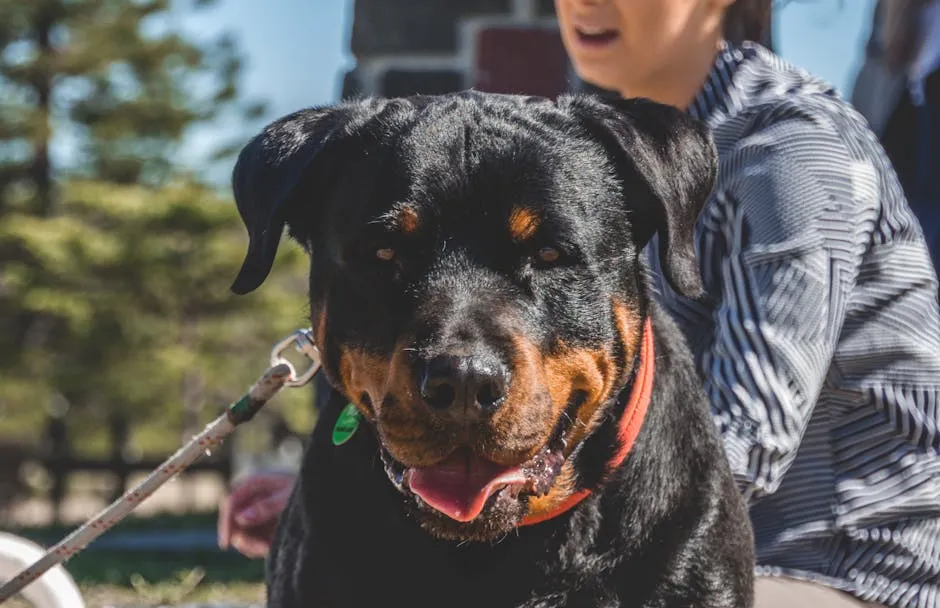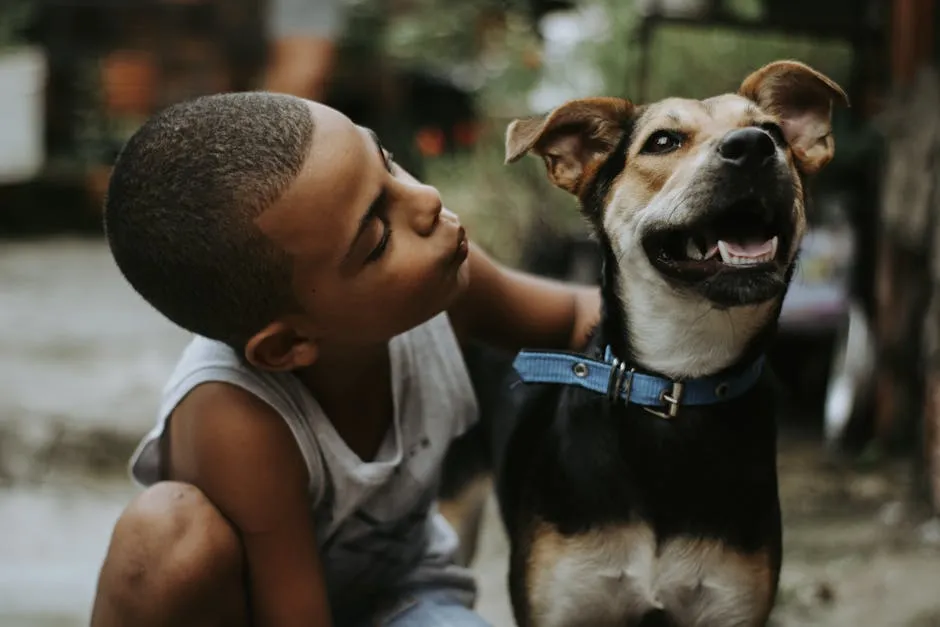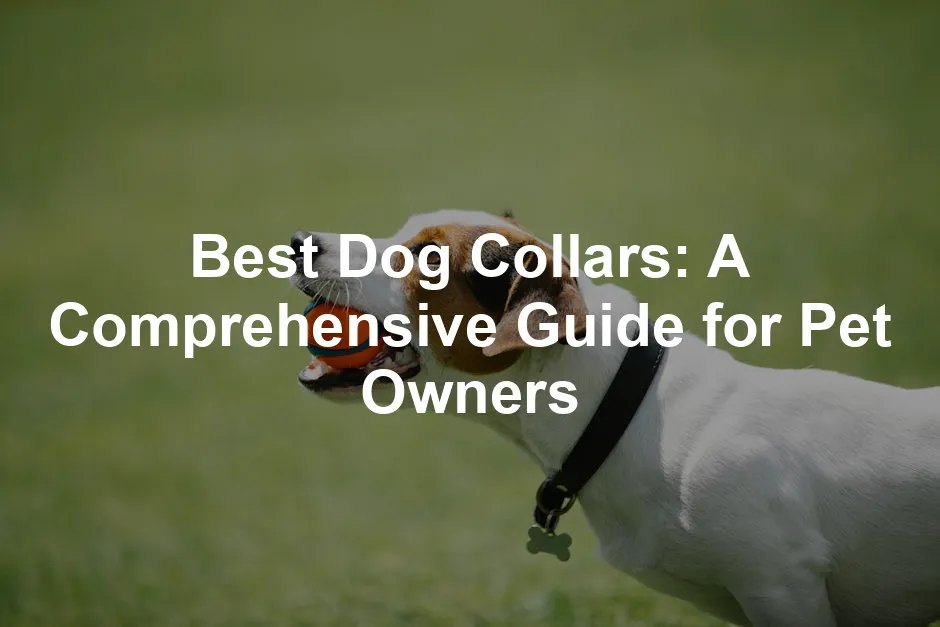Introduction
Choosing the right dog collar is essential. It affects your dog’s comfort and safety. With so many options available, finding the perfect collar can feel overwhelming. Don’t worry; we’ll help you navigate this decision! This guide covers various types of collars, their features, and recommendations tailored for your furry friend.
Summary and Overview
In this article, we’ll discuss different types of dog collars. You’ll learn about their features, benefits, and ideal uses. Selecting the right collar is crucial for ensuring your pup’s comfort and safety. We’ll also outline the criteria for evaluating the best options to suit your pet’s needs.
Types of Dog Collars
Regular Collars
Regular collars are the most common choice for dog owners. They come in several types, each serving a different purpose.
Flat collars are the most typical option. They feature a simple design with a buckle and a metal ring for ID tags. These collars are great for everyday use and can hold your dog’s tags securely. Want to make your pup feel special? Consider a Personalized Dog Collar to add a unique touch!

Tactical collars are designed for larger breeds. Made from strong materials, they often include a built-in handle for better control during walks. These collars are perfect for active dogs that need extra support.
Martingale collars are a popular choice for breeds with narrow heads. They have a loop that tightens when your dog pulls, preventing escape. This design evenly distributes pressure, making it a gentle option for training and everyday use.
Consider your dog’s specific needs when selecting a collar. Each type serves a unique purpose and can enhance your pet’s safety and comfort.
Specialized Collars
Specialized collars address specific training needs. They are often used to correct behavior or assist with training.
Choke chains are metal links that tighten when pulled. They are intended for correcting behavior but can cause discomfort if overtightened. Use them with caution and under guidance. If you’re looking for a safer alternative, consider a Martingale Dog Collar that provides better control without discomfort.
Prong collars, or pinch collars, have prongs that press into the dog’s skin. They mimic a mother dog’s bite to correct behavior. These collars can be effective, but they must be used carefully to avoid causing pain.
Shock collars deliver an electric pulse to the dog’s neck. They can be controlled remotely to reinforce training commands. However, their use is controversial, and it’s essential to approach them with caution. If you want to explore more humane training options, check out the Dog Training Clicker.

Before using specialized collars, consult a professional trainer. They can provide guidance on the best methods for training your dog effectively and humanely.
Key Features to Consider
Material
When it comes to dog collars, the material matters greatly. Common options include nylon, leather, and neoprene.
Nylon collars are popular for their durability and affordability. They come in various colors and designs, making them a fun choice. However, they may not be as comfortable for dogs with sensitive skin. If your pup is prone to skin irritation, consider a Neoprene Dog Collar for comfort.
Leather collars are known for their strength and timeless appeal. They age beautifully but can be pricier and less colorful than nylon.
Neoprene collars offer a soft touch, perfect for pups with sensitive skin. They provide comfort during wear, especially for active dogs. However, neoprene may not be as long-lasting as nylon or leather.
Choosing the right material should reflect your dog’s lifestyle. Consider their activities and comfort to find the perfect match.

Size and Fit
Getting the right collar size is crucial for your dog’s comfort and safety. To measure, use a flexible tape around the base of their neck. Ensure it’s snug but allows for two fingers to fit comfortably underneath.
For growing puppies, opt for adjustable collars. This way, they can grow without needing a new collar too soon. Regularly check the fit, especially as your puppy grows. A loose collar can slip off, while a tight one can cause discomfort. Consider a Adjustable Dog Collar to accommodate their growth!
Remember, a well-fitted collar helps prevent injuries and ensures a pleasant wearing experience for your furry friend.

Design and Style
Dog collars aren’t just functional; they can also be stylish! With countless colors, patterns, and materials, you can find a collar that perfectly fits your pet’s personality.
Think about your dog’s vibe. A playful pup may shine in bright colors, while a regal dog might prefer classic leather. Matching the collar to your taste adds a personal touch, too! For a trendy option, check out the Reflective Dog Collar for those evening walks!
While aesthetics are fun, functionality must not be overlooked. Choose a design that serves your dog’s needs while reflecting your style. Check out trendy collar designs to find the perfect one!

Top Picks for Best Dog Collars
Best Overall
The Lupine Original Designs Dog Collar is a top choice for 2024. It combines comfort, durability, and style. Made from high-quality nylon, this collar offers a soft touch, perfect for everyday wear. Customers rave about its adjustable features, ensuring a snug fit for all breeds. Its vibrant colors and patterns make it a fun addition to your dog’s wardrobe. Plus, it’s backed by a lifetime guarantee, providing peace of mind. Many users appreciate the reflective stitching, enhancing visibility during nighttime walks. Ready to enhance your pup’s style? Learn more here!

Best for Puppies
For your little one, the Max and Neo NEO Dog Collar stands out. This collar is specially designed for growing puppies with its adjustable features. Made from soft, durable materials, it ensures comfort while they explore their new world. The collar is lightweight, making it easy for small pups to wear. Customers love that it comes in various sizes, allowing for a perfect fit as your puppy grows. Remember to check their collar size regularly to keep them comfortable and secure. Give your puppy the best start with a great collar!
Best for Large Dogs
When it comes to large breeds, the Black Rhino Comfort Collar is a fantastic option. This collar is built to withstand the strength of big dogs. Made from durable materials, it features a padded interior for added comfort. Owners appreciate its heavy-duty design, making it ideal for active dogs. The collar also includes a sturdy metal leash attachment point. Many users note that it fits well even for dogs with thick necks. Explore options that fit your dog’s breed and ensure they have the support they need!

Best Personalized Collars
Personalized collars offer a unique touch for your furry friend. They come with various customization options, such as names, phone numbers, or fun designs. This not only makes your pet stand out but also adds a layer of safety.
Having ID information on collars is crucial. In case your dog gets lost, a personalized collar can help others return them home quickly. Custom dog tags can also be added for extra peace of mind. Speaking of ID, don’t forget to check out Dog ID Tags to enhance your pet’s safety!
Want to get creative? Consider fun ideas like adding your dog’s favorite color or a catchy phrase. Whether it’s a playful pattern or a sleek design, the options are endless!

FAQs
What is the best material for dog collars?
Choosing the right material for your dog’s collar is crucial. Nylon is a popular option due to its durability and affordability. It’s available in many colors and patterns. However, it can irritate sensitive skin over time. Leather is another favorite, known for its strength and classic look. It ages beautifully but can be pricier. Neoprene collars are soft and comfortable, perfect for sensitive pups. They provide a snug fit but may not last as long as nylon. Each material has its pros and cons, so consider your dog’s needs and lifestyle before deciding.
How do I measure my dog for a collar?
Measuring your dog for the right collar is straightforward. Use a flexible tape measure around the base of your dog’s neck. Ensure it’s snug but not too tight. You should be able to fit two fingers comfortably underneath. If your dog is a puppy, consider getting an adjustable collar. They grow quickly, and an adjustable fit can save you from frequent replacements. Regularly check the fit to ensure it’s still comfortable and safe.
Are training collars safe for my dog?
Training collars can be effective tools but come with potential risks. They are designed to correct behavior, helping with commands and leash training. However, improper use can lead to discomfort or anxiety. Choke chains, for example, tighten around the neck and can harm if used incorrectly. Prong collars apply pressure but can cause pain if misused. Shock collars deliver an electric pulse, which can be controversial. Always consult a professional trainer before using these collars to ensure safe practices.
How often should I replace my dog’s collar?
Collars should be checked regularly for wear and tear. Look for frays, broken buckles, or any signs of damage. If you notice any issues, it’s time for a replacement. As a general rule, replace your dog’s collar every 6 to 12 months, or sooner if needed. Factors like your dog’s activity level and environment can affect the collar’s lifespan. Keeping your dog safe and comfortable is the priority.
Can I use a collar for both training and identification?
Yes, collars can serve dual purposes! Many owners use collars for identification, attaching ID tags to keep their pets safe. They can also be effective training tools. Flat collars are great for everyday wear and holding tags. Martingale collars work well for training, as they tighten gently when needed. Just ensure you choose a collar that fits your dog’s specific needs. Balancing safety with functionality is key!
Please let us know what you think about our content by leaving a comment down below!
Thank you for reading till here 🙂
For comprehensive insights on selecting the right collar, check out this dog collars guide.
All images from Pexels





